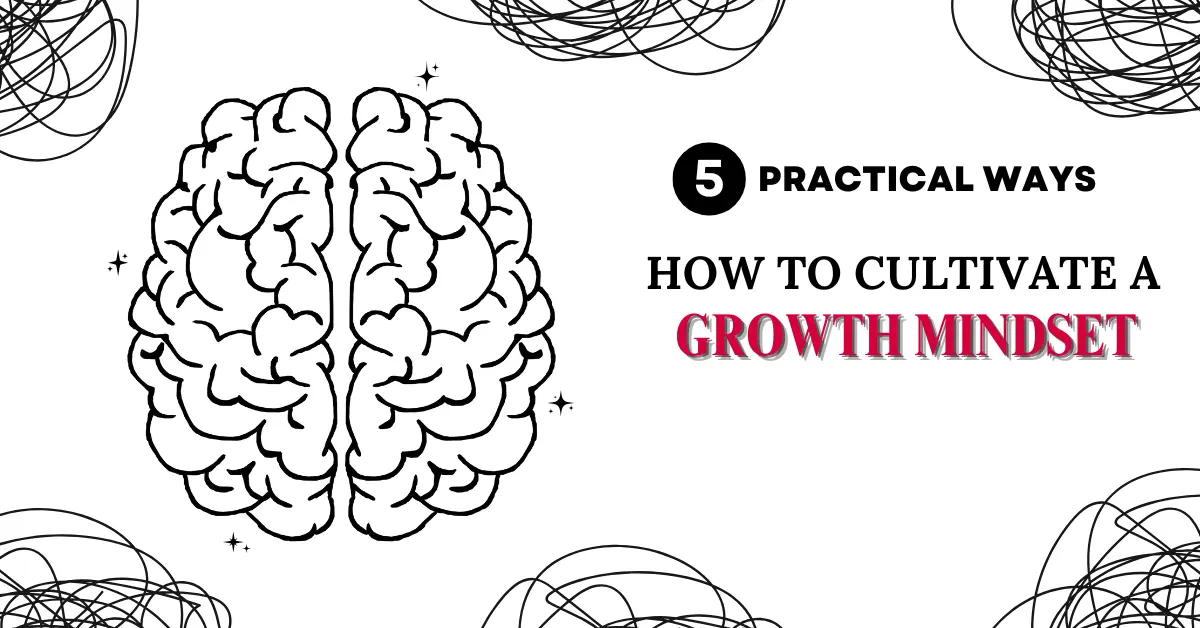
How to Cultivate a Growth Mindset: 5 Practical Ways
- 77
- 0
- 0
Cultivating a growth mindset means believing that skills and intelligence can be developed with effort, learning, and persistence. To build this mindset, embrace challenges, learn from feedback, and see failures as opportunities to grow. Surround yourself with supportive, positive influences, and keep a focus on continuous improvement. A growth mindset is important because it encourages resilience, adaptability, and a love for learning, which are essential for personal and professional success. It helps you overcome obstacles and achieve your goals.
How to Cultivate a Growth Mindset
Have you ever thought “I’m just not good at this” or “I’ll never be able to learn that”? These thoughts show a fixed mindset – the belief that our abilities are set in stone. But here’s the good news: you can change this way of thinking! A growth mindset means believing that you can improve and grow through effort, learning, and trying new things.
Let’s look at 5 practical ways how to cultivate a growth mindset that can help you achieve more in life:
Change Your Self-Talk

The way we talk to ourselves counts more than we believe. When facing a challenge, instead of saying “I can’t do this,” try saying “I can’t do this yet.” This simple change makes a big difference. Here’s how to improve your self-talk:
- Replace “I’m not good at math” with “I’m working on getting better at math”
- Instead of “This is too hard,” say “This may take some time to figure out”
- Change “I made a blunder” to “I understood what doesn’t work”
Remember: Your words shape your thoughts, and your thoughts shape your actions.
Learn from Mistakes

Many people try to hide their mistakes or feel ashamed when they fail. But in a growth mindset, mistakes are valuable teachers. Here’s what you can do:
- Write down what went wrong
- Think about what you learned from the situation
- Plan how you’ll do things differently next time
- Thank people who point out your mistakes (they’re helping you grow!)
For example, if you give a presentation that doesn’t go well, don’t beat yourself up. Instead, ask for feedback, notice what parts need work, and use this information to make your next presentation better.
Take on New Challenges

Your comfort zone might feel safe, but growth happens when you step outside it. Begin with small challenges and slowly take on larger ones. Here’s how:
- Pick one new thing to learn each month (like cooking a new dish or learning basic words in a new language)
- Volunteer for projects at work that stretch your skills
- Try activities that you’ve always wanted to do but felt nervous about
- Set goals that feel slightly out of reach
Remember: It’s okay to feel uncomfortable or nervous. These feelings mean you’re growing!
Value the Process, Not Just the Results

In today’s world, we often focus too much on results. But with a growth mindset, the journey matters just as much as the destination. Try these approaches:
- Keep a learning journal to track your progress
- Celebrate small improvements
- Notice the effort you put in, not just what you achieve
- Share your learning journey with others
For instance, if you’re learning to play guitar, don’t just focus on mastering a song. Notice how your finger placement gets better, how you’re learning to read music, and how you’re developing better rhythm.
Surround Yourself with Growth-Minded People

The people around us greatly influence our thinking and behavior. To build a growth mindset:
- Connect with people who love learning
- Find friends who support your goals
- Join groups or communities focused on learning and improvement
- Share your plans with others who will inspire you
- Look for mentors who can guide you
Think of it like plants growing together in a garden – when you’re around others who are growing, you’re more likely to grow too.
Making These Changes Last
Building a growth mindset takes time and practice. Here are some tips to help make these modifications attach:
Start Small
- Pick one area of your life to practice
- a growth mindset
- Make tiny changes each day
- Build on small successes
Track Your Progress
- Keep notes about your mindset changes
- Write down wins and challenges
- Notice patterns in your thinking
Be Patient with Yourself
- Change doesn’t happen overnight
- Hope some days to be harder than others
- Remember that setbacks are normal
Create Reminders
- Put sticky notes with growth mindset phrases on your mirror
- Set phone reminders to check your thinking
- Keep a growth mindset quote where you can see it daily
Real-Life Benefits
When you develop a growth mindset, you’ll likely notice:
- Better problem-solving skills
- More confidence in trying new things
- Stronger relationships as you become more open to feedback
- Less stress about making mistakes
- More enjoyment in learning and growing
- Better results in work and personal projects
Final Thoughts
Remember: A growth mindset isn’t about being positive all the time or pretending everything is easy. It’s about believing in your ability to learn and improve. Start with small steps, be patient with yourself, and watch how your life changes when you believe in your potential to grow.
Every day brings new chances to practice these ideas. Which one will you try first? Your journey to a growth mindset starts with a single step – and that step can be today.
FAQs
What is a growth mindset?
A growth mindset means believing that skills and intelligence can improve with effort and practice. It focuses on learning, persistence, and viewing challenges as opportunities to grow and succeed.
How can I develop a growth mindset?
Start by embracing challenges, seeking feedback, and learning from mistakes. Focus on progress, not perfection, and celebrate small achievements. Surround yourself with positive people who encourage continuous learning and improvement.
Why is a growth mindset important?
It allows you to become more resilient, flexible, and open to new experiences. A growth mindset allows you to see setbacks as learning opportunities, which leads to greater success in your personal and professional life.
Can anyone build a growth mindset?
Yes, anyone can develop a growth mindset. It starts with changing how you think about your abilities. Believe in your potential to grow, and keep putting in effort and patience for continuous improvement.
How does a growth mindset affect learning?
A growth mindset makes learning easier and more enjoyable. You’ll be more open to new ideas, willing to try, and less afraid of failure, leading to better skills and knowledge over time.
Also Read:
7 Tips on Goal-Setting, Staying Motivated, and Tracking Progress
References:
https://hbr.org/2016/01/what-having-a-growth-mindset-actually-means
Disclaimer:
The tips provided for cultivating a growth mindset are for informational purposes only. Results may vary based on individual effort, environment, and circumstances. Always seek professional advice for personalized guidance on mental and emotional well-being.
Related post

7 Health Benefits of Assam Tea


